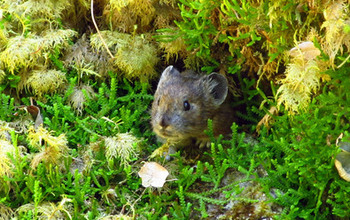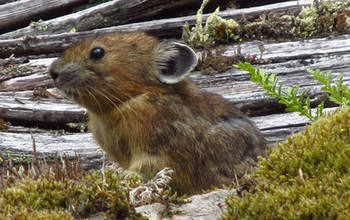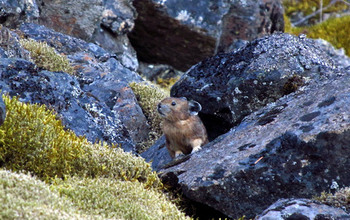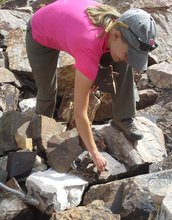All Images
News Release 13-204
Mountain pikas, relatives of rabbits, survive at warm sea-level temperatures by eating mosses
Mosses also may protect high-peak pikas against climate change effects
This material is available primarily for archival purposes. Telephone numbers or other contact information may be out of date; please see current contact information at media contacts.

A small mammal known as a pika peers out from behind thick moss in Oregon's Columbia River Gorge.
Credit: Jo Varner
Download the high-resolution JPG version of the image. (3.3 MB)
Use your mouse to right-click (Mac users may need to Ctrl-click) the link above and choose the option that will save the file or target to your computer.

Researchers discovered that high-elevation pikas survive at sea-level by eating moss.
Credit: Mallory Lambert
Download the high-resolution JPG version of the image. (2.5 MB)
Use your mouse to right-click (Mac users may need to Ctrl-click) the link above and choose the option that will save the file or target to your computer.

A pika sits among rocks and moss; on high peaks, pikas are threatened by global warming.
Credit: Jo Varner
Download the high-resolution JPG version of the image. (2.7 MB)
Use your mouse to right-click (Mac users may need to Ctrl-click) the link above and choose the option that will save the file or target to your computer.

Biologist Jo Varner collects vegetation from the "haypiles" pikas build under rockpiles in winter.
Credit: Erin Moulding
Download the high-resolution JPG version of the image. (1.3 MB)
Use your mouse to right-click (Mac users may need to Ctrl-click) the link above and choose the option that will save the file or target to your computer.

Jo Varner and Denise Dearing found that pikas may be able to adapt to climate change.
Credit: University of Utah
Download the high-resolution JPG version of the image. (1.6 MB)
Use your mouse to right-click (Mac users may need to Ctrl-click) the link above and choose the option that will save the file or target to your computer.


